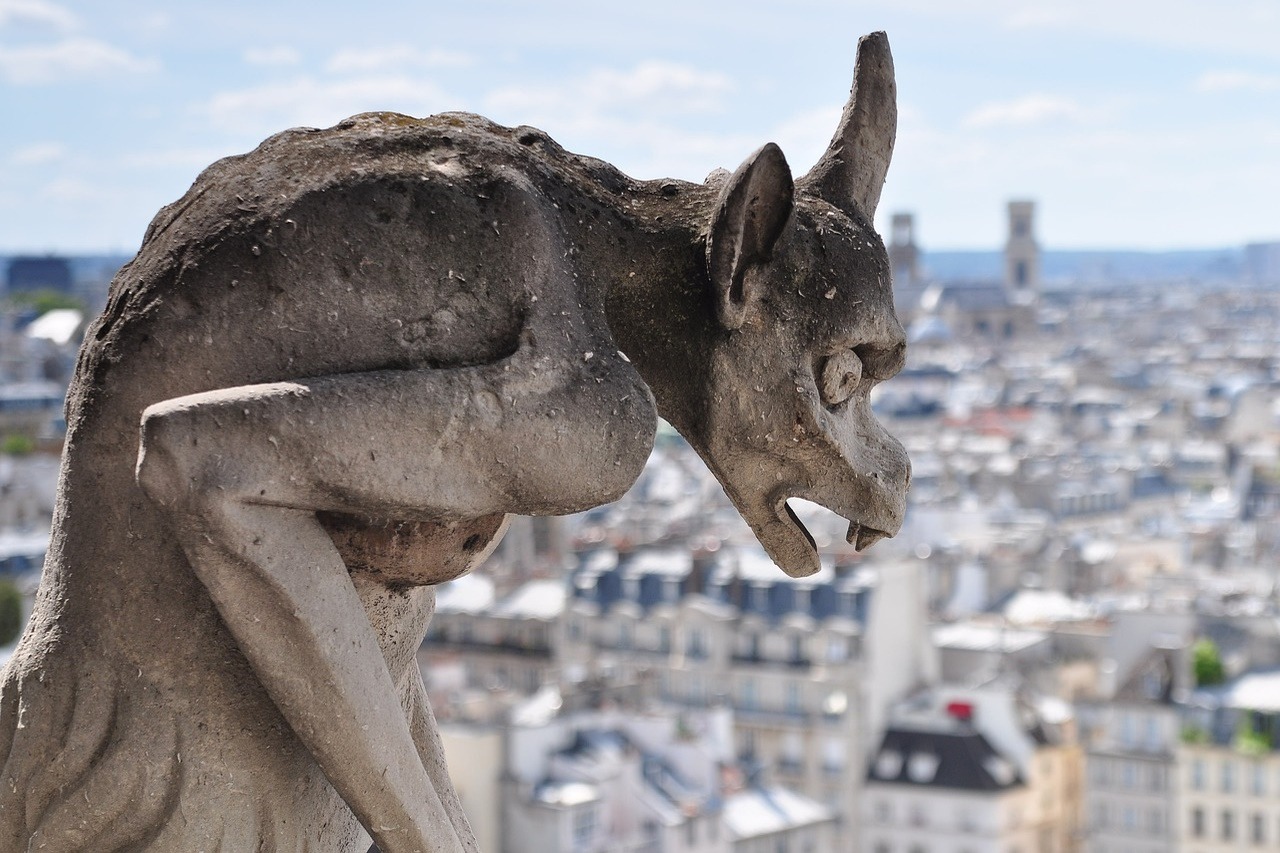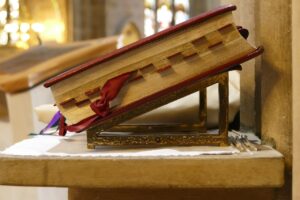Acts 6:1-7 (RM) or Acts 7: 55-60 (RCL); Psalm 33 or 31; 1 Peter 2: 4-9 (RM) or 2-10 (RCL); John 14: 1-12 (RM) or 1-14 (RCL).
Oh darn, I really enjoyed thinking that this week was Quasimodo Sunday. As it turns out, it’s not. Quasimodo Sunday was the Second Sunday of Easter.
You’re probably wondering what the Hunchback of Notre Dame has to do with Sunday liturgy … or visualizing Charles Laughton swinging on the bell rope of the cathedral in the 1939 movie… or even the Muppets’ parody with Kermit the Frog, “The Lunchbox of Notre Dame.”
No. Each Sunday used to be identified by the first word or two of its Introit, in Latin: for example, Laetare Sunday would start with the Latin word for “Rejoice!” sung right at the beginning. Roman Catholics can find these titles in the Tridentine Missal. Lutherans can find them in the 1958 Service Book and Hymnal.
The point is that Quasi modo geniti is the start of our Second Reading for today, from 1 Peter 2:2, “As newborn babes desire the pure spiritual milk.” That’s in the Revised Common Lectionary. The Roman Missal however begins with verse 4, “Come to him, a living stone.” Both versions go on to rhapsodize wonderfully about Christ as the capstone, the stone which the builders rejected, and the community of believers as an edifice built up of living stones. And the metaphors get even better. But the RCL gets it right by beginning with Baptism.
The author of this letter (not Peter the apostle – this text was completed well after his death) may have been writing an inspiring and energizing instruction for baptismal candidates. The text cites Psalm 118:22 with its startling imagery of “the stone that the builders rejected, that became the capstone” of the edifice where God is present. A building not of stones like the Temple that was destroyed, but “living stones,” human witnesses to their faith, humans who could strengthen each other, humans whose very existence pointed to a living reality beyond themselves. What a joyful welcome into the Christian community, especially in a period of history when adhering to the Christian faith might cost you your life.
The metaphors hold up for us today when we anchor them all in the meaning of our Baptism, especially the images of “a holy priesthood offering spiritual sacrifices … a royal priesthood, a holy nation.” Speaking of the common priesthood, or the priesthood of all the faithful or of all believers, used to sound dangerously, well, democratic. But not when you root it in the dignity of Baptism.
And there is one Baptism. Not one for the elite and another for the rest of us.
The idea of offering sacrifices can be off-putting today, as if we’re still, at least symbolically, standing around the altar killing terrified animals. There are better ways to parse this. We can speak of “ethical” sacrifices – doing the right thing when it’s difficult or intimidating, defending those who suffer from injustice, putting ourselves on the line for others whatever their circumstances. Then there’s the “sacrifice of praise.” Think about it – when we praise the Holy One, we’re letting go of our own ego. We’ve stopped putting ourselves in the centre of the universe. And thirdly, as the author of 1 Peter writes, there’s a sacrifice of proclamation, of declaring the wonderful deeds of salvation history, retelling the stories of how God was experienced as real and dynamically active among us and on our earth. Part of that is finding the courage to tell our own stories. That can be hard if we feel vulnerable, or unduly exposed, when we dare to be honest about shortcomings or pain. But our honesty can give others the courage to share their own stories, and in the end, we’re all the richer for it.
Does anyone remember a cheerful, upbeat pop song from 1958 titled “Volare?”
“Volare … oh oh…cantare … oh oh oh oh…”
The word volare means “fly” in Italian.
This week let’s spread our wings, take a deep breath of the Spirit, and fly, on what we’ll call, “Volare Sunday.”
© Susan K. Roll
Susan Roll retired from the Faculty of Theology at Saint Paul University, Ottawa, in 2018, where she served as Director of the Sophia Research Centre. Her research and publications are centred in the fields of liturgy, sacraments, and feminist theology. She holds a Ph.D. from the Catholic University of Leuven (Louvain), Belgium, and has been involved with international academic societies in liturgy and theology, as well as university chaplaincy, Indigenous ministry and church reform projects.





Thank you for your weekly reflections, Susan. I always find nourishment there. I especially appreciated your reframing of “sacrifice” this week – choices whereby I stop “putting (myself) in the centre of the universe.”
I too appreciate very much the way you open the concept of “sacrifice” – beyond “standing around the altar killing terrified animals” – as riveting and focusing as that may be! “Ethical” sacrifices; “sacrifice of praise”, sacrifice of proclamation – much to think about.